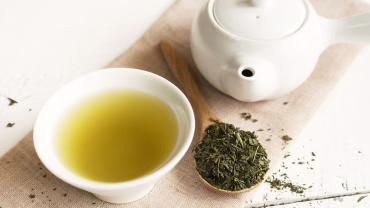
What is L-Theanine?
L-Theanine (theanine) is a unique amino acid found in green tea (Camellia sinensis L.). A cup of green tea contains approximately 25 mg of theanine. This amino acid contributes to green tea's distinct umami flavor and aroma while also counterbalancing the bitterness of caffeine. Moreover, theanine has demonstrated various health benefits, such as promoting healthy stress responses, sleep, and cognitive function due to its calming properties.
Calming Properties
Theanine demonstrates calming properties likely due to its structure being similar to L-glutamic acid, where it may help reduce the binding of glutamine to glutamate receptors (mGLU). Rodent models demonstrate that theanine modulates monoamine metabolism in the central nervous system. It may also influence glutamic acid and glycine neurotransmissions and act as a partial co-agonist on the N-methyl-D-aspartate (NMDA) receptor. Theanine is absorbed in the intestinal lumen and transported to various tissues in less than 30 minutes, including the brain. Additionally, human studies reveal that theanine may increase alpha-wave activity in the brain, contributing to its calming properties.
Promoting Healthy Stress Responses
A systematic review of 9 randomized, placebo-controlled clinical trials (n = 270) suggests that theanine may help promote healthy stress responses among individuals exposed to acute stressful conditions. This includes a range of physical and mental tasks. The researchers concluded that consumption of theanine might be clinically beneficial during times of heightened acute stress or by individuals with unhealthy stress responses. This is consistent with findings from previous human and rodent studies.
Human research studies also indicate that theanine may help promote cognitive function, potentially supporting healthy stress responses. Adults consuming theanine have reported improved focus and attention and reduced mind wandering. Sixty-nine adults aged 50 to 69 in a randomized placebo-controlled study exhibited improved attention, working memory, and executive function after theanine administration.
Promoting Sleep Quality
Theanine has been shown to promote healthy sleep without increasing the risk of drowsiness. A study involving 22 subjects found that those who consumed theanine displayed improved sleep quality and dream quality by reducing dream recall and nightmares. Compared to the placebo group, theanine recipients reported feeling significantly more refreshed and recovered from exhaustion or fatigue upon awakening. However, there were no significant differences between theanine and the placebo for sleep duration.
Furthermore, a randomized, double-blind, placebo-controlled crossover study with 27 healthy daytime workers observed that morning administration of theanine did not induce daytime drowsiness. In fact, those receiving theanine exhibited improved alertness parameters and less drowsiness than the placebo group, especially in the morning for subjects who typically go to bed after midnight.
Conclusions
As the benefits of green tea continue to receive recognition, theanine may be a key contributor. Theanine, whether consumed alone or within green tea, holds calming properties that may have clinical relevance for the general population. It can potentially promote healthy stress responses, sleep, and cognitive function due to its calming properties.
By Danielle Moyer, MS, CNS LDN